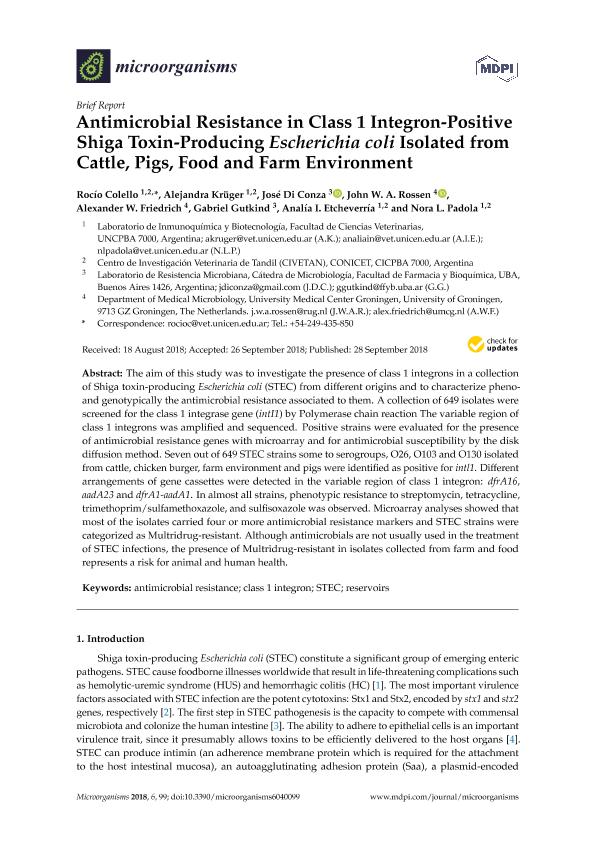Artículo
Antimicrobial Resistance in Class 1 Integron-Positive Shiga Toxin-Producing Escherichia coli Isolated from Cattle, Pigs, Food and Farm Environment
Colello, Rocío ; Krüger, Alejandra
; Krüger, Alejandra ; Di Conza, José Alejandro
; Di Conza, José Alejandro ; Rossen, John; Friedrich, Alexander; Gutkind, Gabriel Osvaldo
; Rossen, John; Friedrich, Alexander; Gutkind, Gabriel Osvaldo ; Etcheverría, Analía Inés
; Etcheverría, Analía Inés ; Padola, Nora Lía
; Padola, Nora Lía
 ; Krüger, Alejandra
; Krüger, Alejandra ; Di Conza, José Alejandro
; Di Conza, José Alejandro ; Rossen, John; Friedrich, Alexander; Gutkind, Gabriel Osvaldo
; Rossen, John; Friedrich, Alexander; Gutkind, Gabriel Osvaldo ; Etcheverría, Analía Inés
; Etcheverría, Analía Inés ; Padola, Nora Lía
; Padola, Nora Lía
Fecha de publicación:
09/2018
Editorial:
MDPI
Revista:
Microorganisms
ISSN:
2076-2607
Idioma:
Inglés
Tipo de recurso:
Artículo publicado
Clasificación temática:
Resumen
The aim of this study was to investigate the presence of class 1 integrons in a collection of Shiga toxin-producing Escherichia coli (STEC) from different origins and to characterize pheno-and genotypically the antimicrobial resistance associated to them. A collection of 649 isolates were screened for the class 1 integrase gene (intI1) by Polymerase chain reaction The variable region of class 1 integrons was amplified and sequenced. Positive strains were evaluated for the presence of antimicrobial resistance genes with microarray and for antimicrobial susceptibility by the disk diffusion method. Seven out of 649 STEC strains some to serogroups, O26, O103 and O130 isolated from cattle, chicken burger, farm environment and pigs were identified as positive for intl1. Different arrangements of gene cassettes were detected in the variable region of class 1 integron: dfrA16, aadA23 and dfrA1-aadA1. In almost all strains, phenotypic resistance to streptomycin, tetracycline, trimethoprim/sulfamethoxazole, and sulfisoxazole was observed. Microarray analyses showed that most of the isolates carried four or more antimicrobial resistance markers and STEC strains were categorized as Multridrug-resistant. Although antimicrobials are not usually used in the treatment of STEC infections, the presence of Multridrug-resistant in isolates collected from farm and food represents a risk for animal and human health.
Palabras clave:
ANTIMICROBIAL RESISTANCE
,
CLASS 1 INTEGRON
,
RESERVOIRS
,
STEC
Archivos asociados
Licencia
Identificadores
Colecciones
Articulos(CIVETAN)
Articulos de CENTRO DE INVESTIGACION VETERINARIA DE TANDIL
Articulos de CENTRO DE INVESTIGACION VETERINARIA DE TANDIL
Articulos(OCA HOUSSAY)
Articulos de OFICINA DE COORDINACION ADMINISTRATIVA HOUSSAY
Articulos de OFICINA DE COORDINACION ADMINISTRATIVA HOUSSAY
Citación
Colello, Rocío; Krüger, Alejandra; Di Conza, José Alejandro; Rossen, John; Friedrich, Alexander; et al.; Antimicrobial Resistance in Class 1 Integron-Positive Shiga Toxin-Producing Escherichia coli Isolated from Cattle, Pigs, Food and Farm Environment; MDPI; Microorganisms; 6; 4; 9-2018; 1-8
Compartir
Altmétricas



